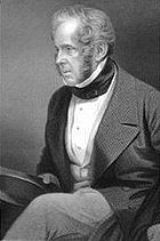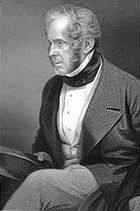
London Conference of 1832
Encyclopedia
The London Conference of 1832 was an international conference convened to establish a stable government in Greece
. Negotiations between the three Great Powers (Britain
, France
and Russia
) resulted in the establishment of the Kingdom of Greece
under a Bavarian Prince
. The decisions were ratified in the Treaty of Constantinople
later that year. The treaty followed the Akkerman Convention
which had previously recognized another territorial change in the Balkans
, the suzerainty
of Principality of Serbia.
had won its independence from the Ottoman Empire
in the Greek War of Independence
(1821-1829) with the help of Britain, France and Russia. In the London Protocol of February 3, 1830, the three powers had assigned the borders of the new state. However, when the governor of Greece, John Capodistria (Ioannis Kapodistrias) (Καποδíστριας) was assassinated in 1831 in Nafplion
, the Greek peninsula plunged into confusion. The Great Powers sought a formal end of the war and a recognized government in Greece.

n Prince, Otto
. They also established the line of succession which would pass the crown to Otto's descendants, or his younger brothers should he have no issue. It was also decided that in no case would the crowns of Greece and Bavaria be joined. As co-guarantors of the monarchy, the Great Powers also empowered their ambassadors in Constantinople
, the Ottoman
capital, to secure the end of the Greek War of Independence
.
On July 21, 1832 British ambassador Sir Stratford Canning
and the other representatives concluded the Treaty of Constantinople
, which set the boundaries of the new Kingdom of Greece
at a line running from Arta
(Αρτα) to Volos
(Βολος).
Greece
Greece , officially the Hellenic Republic , and historically Hellas or the Republic of Greece in English, is a country in southeastern Europe....
. Negotiations between the three Great Powers (Britain
United Kingdom of Great Britain and Ireland
The United Kingdom of Great Britain and Ireland was the formal name of the United Kingdom during the period when what is now the Republic of Ireland formed a part of it....
, France
France
The French Republic , The French Republic , The French Republic , (commonly known as France , is a unitary semi-presidential republic in Western Europe with several overseas territories and islands located on other continents and in the Indian, Pacific, and Atlantic oceans. Metropolitan France...
and Russia
Russian Empire
The Russian Empire was a state that existed from 1721 until the Russian Revolution of 1917. It was the successor to the Tsardom of Russia and the predecessor of the Soviet Union...
) resulted in the establishment of the Kingdom of Greece
Kingdom of Greece
The Kingdom of Greece was a state established in 1832 in the Convention of London by the Great Powers...
under a Bavarian Prince
Otto of Greece
Otto, Prince of Bavaria, then Othon, King of Greece was made the first modern King of Greece in 1832 under the Convention of London, whereby Greece became a new independent kingdom under the protection of the Great Powers .The second son of the philhellene King Ludwig I of Bavaria, Otto ascended...
. The decisions were ratified in the Treaty of Constantinople
Treaty of Constantinople (1832)
The Τreaty of Constantinople was the product of the Constantinople Conference which opened in February 1832 with the participation of the Great Powers on the one hand and the Ottoman Empire on the other. The factors which shaped the treaty included the refusal of Léopold, King of Belgium, to...
later that year. The treaty followed the Akkerman Convention
Akkerman Convention
The Akkerman Convention was a treaty signed on October 7, 1826 between the Russian and the Ottoman Empires in the Budjak citadel of Akkerman . It imposed that the hospodars of Moldavia and Wallachia be elected by their respective Divans for seven-year terms, with the approval of both Powers...
which had previously recognized another territorial change in the Balkans
Balkans
The Balkans is a geopolitical and cultural region of southeastern Europe...
, the suzerainty
Suzerainty
Suzerainty occurs where a region or people is a tributary to a more powerful entity which controls its foreign affairs while allowing the tributary vassal state some limited domestic autonomy. The dominant entity in the suzerainty relationship, or the more powerful entity itself, is called a...
of Principality of Serbia.
Background
GreeceGreece
Greece , officially the Hellenic Republic , and historically Hellas or the Republic of Greece in English, is a country in southeastern Europe....
had won its independence from the Ottoman Empire
Ottoman Empire
The Ottoman EmpireIt was usually referred to as the "Ottoman Empire", the "Turkish Empire", the "Ottoman Caliphate" or more commonly "Turkey" by its contemporaries...
in the Greek War of Independence
Greek War of Independence
The Greek War of Independence, also known as the Greek Revolution was a successful war of independence waged by the Greek revolutionaries between...
(1821-1829) with the help of Britain, France and Russia. In the London Protocol of February 3, 1830, the three powers had assigned the borders of the new state. However, when the governor of Greece, John Capodistria (Ioannis Kapodistrias) (Καποδíστριας) was assassinated in 1831 in Nafplion
Nafplion
Nafplio is a seaport town in the Peloponnese in Greece that has expanded up the hillsides near the north end of the Argolic Gulf. The town was the first capital of modern Greece, from the start of the Greek Revolution in 1821 until 1834. Nafplio is now the capital of the peripheral unit of...
, the Greek peninsula plunged into confusion. The Great Powers sought a formal end of the war and a recognized government in Greece.

Conference of London
In May, 1832, British Foreign Secretary Palmerston convened with French and Russian diplomats, and, without consultation of the Greeks, decided that Greece should be a monarchy. The convention offered the throne to the BavariaBavaria
Bavaria, formally the Free State of Bavaria is a state of Germany, located in the southeast of Germany. With an area of , it is the largest state by area, forming almost 20% of the total land area of Germany...
n Prince, Otto
Otto of Greece
Otto, Prince of Bavaria, then Othon, King of Greece was made the first modern King of Greece in 1832 under the Convention of London, whereby Greece became a new independent kingdom under the protection of the Great Powers .The second son of the philhellene King Ludwig I of Bavaria, Otto ascended...
. They also established the line of succession which would pass the crown to Otto's descendants, or his younger brothers should he have no issue. It was also decided that in no case would the crowns of Greece and Bavaria be joined. As co-guarantors of the monarchy, the Great Powers also empowered their ambassadors in Constantinople
Constantinople
Constantinople was the capital of the Roman, Eastern Roman, Byzantine, Latin, and Ottoman Empires. Throughout most of the Middle Ages, Constantinople was Europe's largest and wealthiest city.-Names:...
, the Ottoman
Ottoman Empire
The Ottoman EmpireIt was usually referred to as the "Ottoman Empire", the "Turkish Empire", the "Ottoman Caliphate" or more commonly "Turkey" by its contemporaries...
capital, to secure the end of the Greek War of Independence
Greek War of Independence
The Greek War of Independence, also known as the Greek Revolution was a successful war of independence waged by the Greek revolutionaries between...
.
On July 21, 1832 British ambassador Sir Stratford Canning
Stratford Canning, 1st Viscount Stratford de Redcliffe
Stratford Canning, 1st Viscount Stratford de Redcliffe KG GCB PC , was a British diplomat and politician, best known as the longtime British Ambassador to the Ottoman Empire...
and the other representatives concluded the Treaty of Constantinople
Treaty of Constantinople (1832)
The Τreaty of Constantinople was the product of the Constantinople Conference which opened in February 1832 with the participation of the Great Powers on the one hand and the Ottoman Empire on the other. The factors which shaped the treaty included the refusal of Léopold, King of Belgium, to...
, which set the boundaries of the new Kingdom of Greece
Kingdom of Greece
The Kingdom of Greece was a state established in 1832 in the Convention of London by the Great Powers...
at a line running from Arta
Arta, Greece
Arta is a city with a rich history in northwestern Greece, capital of the peripheral unit of Arta, which is part of Epirus region. The city was known in ancient times as Ambracia . Arta is famous for its old bridge located over the Arachthos River, situated west of downtown...
(Αρτα) to Volos
Volos
Volos is a coastal port city in Thessaly situated midway on the Greek mainland, about 326 km north of Athens and 215 km south of Thessaloniki...
(Βολος).

